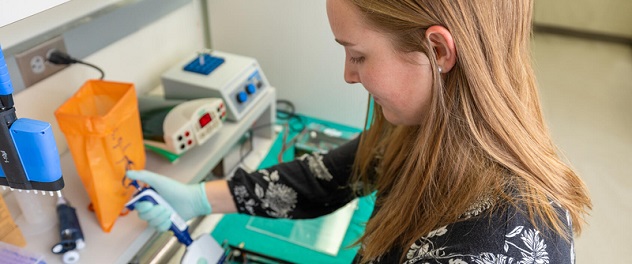-

High-throughput automation
Proper liquid handling techniques are critical for all experiments. In Dr. Ross' lab, the use of liquid handling robots is essential.
-

Genetic variation studies
Single nucleotide polymorphism is a change in the genetic code at a single locus. In Dr. Ross' lab, many genetic variation studies are performed to analyze the importance of specific variants at loci throughout the genome.
-

Leading the way
The Ross team incorporates the use of extracellular vesicles with real-time quaking-induced conversion (RT-QuIC) technologies to gain insight on alpha-synuclein (SNCA) seeding properties and their correlation to Parkinson's disease and other neurological diseases, such as dementia with Lewy bodies.
-

Global sampling
Dr. Ross' lab receives samples from many countries around the world. Genetic studies are impossible without good quality genetic material from clinical patients, healthy controls and deceased individuals.
-

Bioinformatic tools to tackle -omics
As the genetic field is constantly evolving, the Ross lab is incorporating state of the art bioinformatic approaches in their multi -omic datasets.
Overview
Parkinson's disease is the second most common neurodegenerative disorder after Alzheimer's disease, affecting approximately 2% of people age 65 or older. It is estimated that more than 1 million people in the United States have Parkinson's disease.
Typically defined by characteristic motor dysfunction, Parkinson's disease is a progressive disorder that is a result of profound degeneration of dopamine neurons in the basal ganglia and the substantia nigra pars compacta. Clinically, Parkinson's disease is diagnosed when individuals have resting tremor, slowness of movement, rigidity, postural instability and a good response to levodopa therapy. Pathologically, neurons from brains of patients with Parkinson's disease contain hallmark protein inclusions in the form of Lewy bodies and Lewy neurites.
At Mayo Clinic, Parkinson's disease research is an integrated, multidisciplinary research program that brings together neurologists, neuropsychologists, geneticists, neuropathologists and basic scientists to study the molecular etiology of parkinsonism. Investigators use clinical data generated from Mayo Clinic's Division of Movement Disorders, as well as data from the epidemiologic and longitudinal studies of Parkinson's disease, dementia with Lewy bodies, and aging, to advance basic science research projects. This is coupled with a strong institutional commitment to Parkinson's disease research in the form of faculty research funds, an invited speaker seminar series, sponsorship of movement disorder fellowships, pilot research grants and generous support for faculty travel to promote intrainstitutional collaborations. These efforts ensure that Mayo Clinic continues to be one of the leading research centers for parkinsonian disorders.
Major achievements of Parkinson's disease research have come from many investigators at Mayo Clinic. These include the discovery of the most common genetic cause of late-onset autosomal dominant Parkinson's disease, mutations within the leucine-rich repeat kinase 2 (LRRK2) gene, as well as the identification of genetic variants in the alpha-synuclein gene (SNCA). Both genes harbor common genetic risk factors for Parkinson's disease. Furthermore, investigators have:
- Identified mutation of VPS35 as a cause of both familial and sporadic PD
- Characterized the genomic architecture of Lewy body dementia
- Pinpointed common mitochondrial DNA haplogroups that influence neurodegeneration
- Established robust genetic programs for rare parkinsonian disorders, progressive supranuclear palsy, corticobasal degeneration, multiple system atrophy and Pick's disease
By studying people who have Parkinson's disease and related disorders, the Mayo Clinic Parkinson's research group is gaining valuable insight into the etiology of these conditions.
About Dr. Ross
Owen A. Ross, Ph.D., is a native of Northern Ireland and joined the Department of Neuroscience at Mayo Clinic's Florida campus in 2005. His initial work helped to elucidate the role of LRRK2 genetics in Parkinson's disease, specifically the identification of the most common genetic cause of Parkinson's disease (LRRK2 G2019S) and the first common functional risk factors for the disease (LRRK2 R1628P and G2385R). He has also played an important role in discerning the genetic factors determining individual risk of rare forms of parkinsonism including Lewy body dementia and multiple system atrophy. Currently, Dr. Ross is an associate professor of neuroscience at Mayo Clinic College of Medicine and Science in Florida, and is a Mayo Clinic Team Science Award recipient. His primary research interest is the genetics of neurodegenerative disorders, specifically Parkinson's disease, as well as stroke and vascular disease.